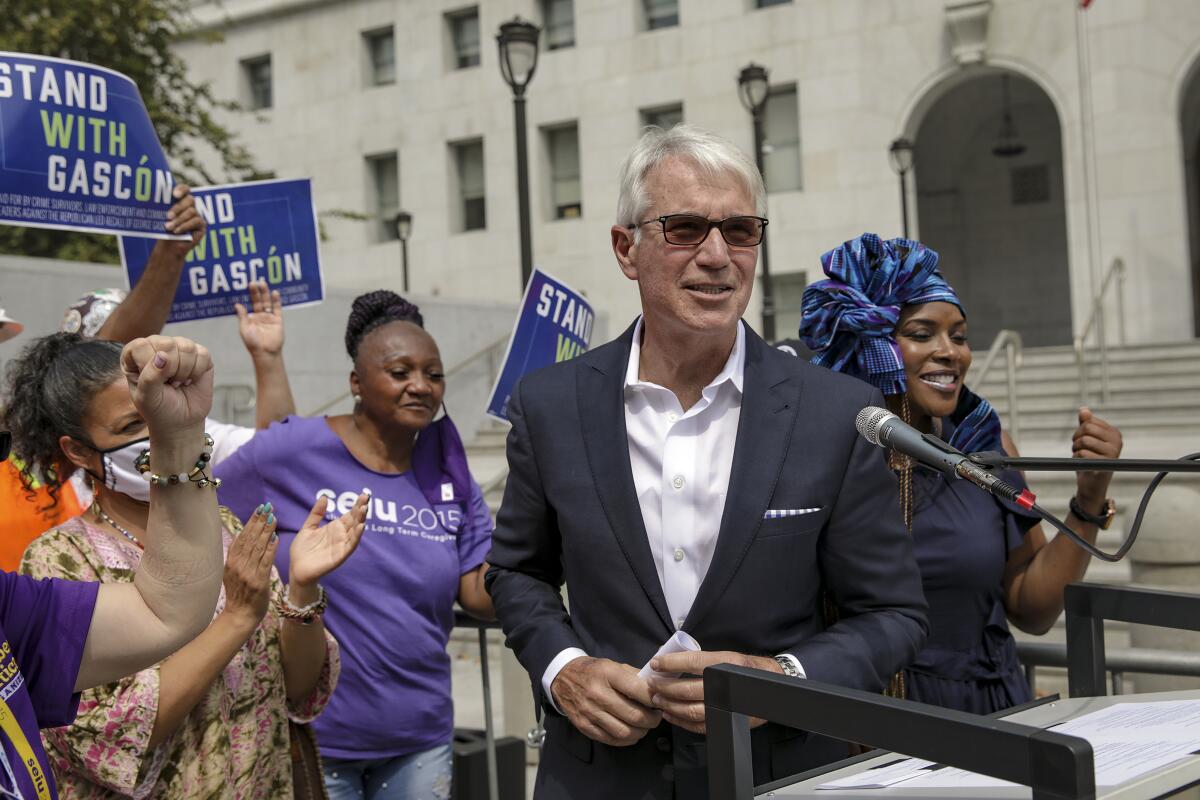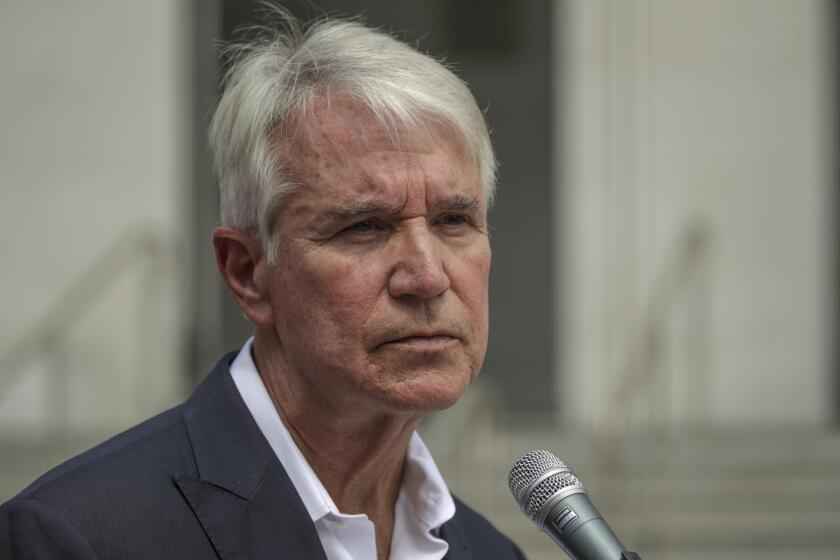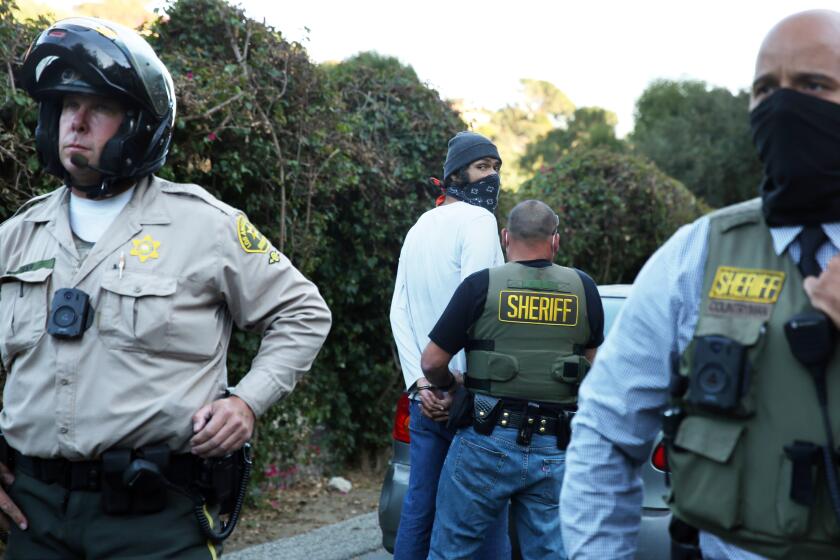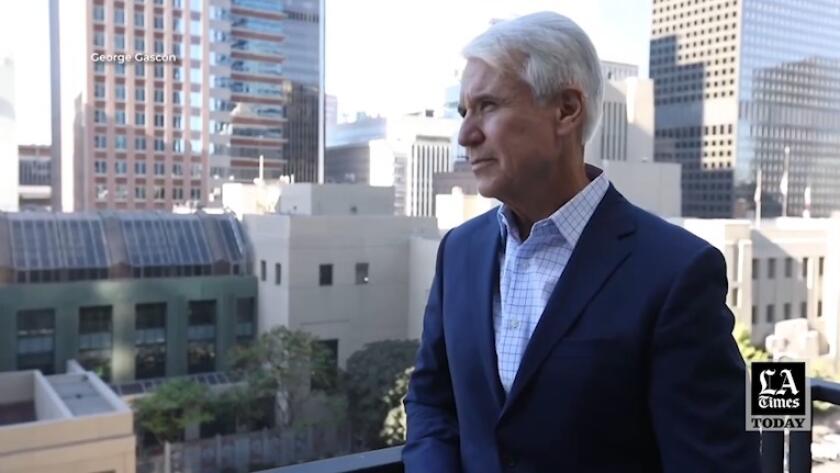L.A. County D.A.’s office under Gascón is at war with itself. How does anything get done?

- Share via
In normal times, the convicted sex offender’s request for leniency would have been met with a swift, emphatic “no” from the Los Angeles County district attorney’s office.
But these aren’t normal times in the D.A.’s office.
So when the felon earlier this year asked a judge to reconsider his 73-year sentence, the prosecutor assigned to the case didn’t object. He couldn’t, he explained in a court filing, because his boss, Dist. Atty. George Gascón, wouldn’t allow it, court records show.
“The District Attorney believes that regardless of the number of charges committed or the number of victims that were harmed that a person should not serve a sentence that is greater than 15 years,” he wrote.
That stance earned the prosecutor’s supervisor a reprimand from one of Gascón’s top aides, who told her the attorney had misrepresented one of the many dramatic changes the district attorney implemented on his first day in office, according to court records. And when the supervisor was demoted to a lowly position in a remote Torrance courthouse, she sued, claiming she had been retaliated against.
The debacle was an example of how deep-seated discord over Gascón and his changes has complicated day-to-day operations within the nation’s largest prosecutor’s office, sometimes turning what should be mundane, routine business into messy affairs.
Dist. Atty. George Gascón announces sweeping policy changes for cash bail in L.A. County and bans seeking sentencing enhancements in nearly all cases.
The office has been roiled by a campaign to recall Gascón that is eagerly supported by most who work there, lawsuits from employees who allege they’ve been punished for objecting to his policies and a level of distrust that has people on both sides of the feud watching what they say and whom they say it to.
In interviews, more than a dozen prosecutors and defense attorneys — a mix of Gascón allies, die-hard recall supporters and those trying to navigate the office fisticuffs without getting hit — agreed that the bad blood pitting Gascón and his inner circle against hundreds of prosecutors they command is at best a distraction and at worst a serious disruption for an office that files more than 100,000 cases each year. Many of the attorneys interviewed requested anonymity to candidly discuss the inner workings of the office because they feared retaliation or disciplinary action.
On his first day in office, Gascón barred prosecutors from seeking the death penalty, trying juveniles as adults or seeking sentencing enhancements that would increase the prison time faced by defendants in a wide array of cases, including those involving the use of a gun or gang activity.
Gascón’s decision to announce the changes without first discussing them with the prosecutors who would be tasked with carrying them out was, according to some critics, his “original sin.” The move hardened their view of Gascón as an idealist with a limited grasp of how to run the office on a practical basis. (A judge has ruled that some of Gascón’s policies are illegal, and the district attorney has backtracked on some of the all-or-nothing changes.)
Those close to Gascón say that because of the widespread backlash to his policies, the district attorney and his inner circle are leery of even speaking to certain employees.
“It has had an impact on communication, because I think the decision-makers in the office feel like, who do you trust?” said one high-ranking official. “I have to be careful who I talk to, what I talk about. We have support staff up here who support the recall. We have [prosecutors] on this floor who support the recall.”
The wariness goes both ways. Deputy Dist. Atty. Richard Ceballos, a hate-crimes prosecutor who once supported Gascón but has since become critical of him, said prosecutors are intentionally withholding case information from their bosses in order to avoid interference from Gascón and his leadership team.
“He’s not aware of what’s going on. The people he surrounds himself with don’t really know what’s going on with the day-to-day operations of the office, and part of it is because we’re not telling them,” Ceballos said. “They’re on a need-to-know basis.”
In a major shift, L.A. County’s top prosecutor said he will allow his office to seek life sentences and to try juveniles as adults in some cases.
In the past, Gascón has voiced concerns that prosecutors were withholding critical information from him, including the existence of damning jailhouse tapes in a controversial case. But in a recent interview, he downplayed the level of discontent, arguing that prosecutors are no longer openly defying his orders, as some did in the early portion of his tenure.
“Not only are we seeing more compliance, but increasingly, some of the bad behavior — really, in some cases, I would say, behavior that was insubordinate — you’re not seeing that,” he said. “There is a core of people who are expressing their political views very openly, which is fine. Sometimes there’s a question as to whether or not they are crossing a legal line on company time … but we are in a much better place than we were a year and a half ago.”
Those political views, however, have seeped into at least one courtroom. Last week, a defense attorney filed a formal complaint to Chief Deputy Dist. Atty. Sharon Woo, saying that a prosecutor had asked the attorney to sign a recall petition as they were discussing a case in court, according to an email obtained by The Times.
The attorney expressed concern that if the prosecutor was “so cavalierly doing this with me, an attorney with whom she does not have any prior professional relationship, one can only assume she is doing this with others.
“It is alarming,” the attorney wrote.
The disputes over Gascón’s policies, some say, are to blame for a staffing shortage in the office.
Roughly 120 prosecutors have left since Gascón took office; many bolted soon after he announced the raft of changes he was making on his first day, according to Eric Siddall, vice president of the union representing prosecutors.
The reduced staff size has led caseloads to balloon. One veteran prosecutor said some of his colleagues have complained that their caseloads have tripled or quadrupled since Gascón took office due to the resignations and a backlog caused by the COVID-19 pandemic. The complaints echo concerns raised by public defenders in recent years.
Public defenders across Los Angeles County say their caseloads have doubled, and in some cases tripled, as the coronavirus has all but paralyzed jury trials.
Gascón said many organizations experienced a “larger than normal rate of attrition” last year but said many of the empty positions highlighted by Siddall had been filled.
Disputes over Gascón’s directives have also fueled a number of lawsuits by employees who believe they were demoted because of their opposition to the district attorney and his policies.
Jodi Link, the supervisor who was demoted in the wake of the sentencing fiasco, is one of seven prosecutors to file a retaliation suit in the past two months. Last week, the two head prosecutors in the district attorney’s Pomona office claimed in a lawsuit that they were punished for opposing the release of a gang member from state prison, according to court records and Siddall.
The prosecutors — Peter Cagney and Karen Thorp — had a dispute with Gascón’s chief of staff, Joseph Iniguez, over how much of the gang member’s violent history to disclose at a court hearing, Siddall said. Ultimately, Thorp presented that information in court, and the defendant’s release was denied, but Cagney and Thorp were quickly reassigned from running the Pomona office to an auto insurance fraud unit, their lawsuit alleges.
The move is part of what some prosecutors consider a pattern of retaliation. Just days into Gascón’s tenure, the former head prosecutor in the Compton courthouse, Richard Doyle, was demoted after refusing to dismiss a case on Gascón’s orders. Doyle sued and has since received a settlement for nearly $1 million, his attorney said.
The lawsuits, Siddall said, are emblematic of a broader problem in the office, in which confusion over how prosecutors are expected to carry out Gascón’s policies has repeatedly spiraled into allegations of retaliation and punishment.
“There’s so much confusion in terms of what the directives mean, what the policies mean, what you can and cannot do, and when the district attorney is running around and telling people 15 years is more than enough time in prison, you could understand why the D.A. in the Breckenridge case might also be confused,” Siddall said, referring to Scott Breckenridge, the felon who sought to have his 73-year sentence reduced.
Lawyers for Link, Cagney and Thorp declined to comment. Gascón would not discuss the specific allegations in the lawsuits but said prosecutors are continuing to misrepresent his policies and their intent in court.
Video reviewed by The Times contradicts sheriff’s accounts of the incident; meanwhile, the case’s dismissal has caused waves in the D.A.’s office.
He pointed to prosecutors from the office’s West Covina branch who, he said, had misinterpreted his policy limiting when certain misdemeanor crimes can be prosecuted. As a result, several suspects who should have been charged with crimes were let off, he said.
Gascón did not say whether he believed the mistake was intentional, but one of his advisors insisted in an interview that some prosecutors “are willing to sacrifice public safety ... to push the narrative about these policies.”
In a retort that underscores the hostility running through the office, Deputy Dist. Atty. Jonathan Hatami, one of the faces of the recall movement, insisted that it is Gascón who has shirked his responsibility to public safety and caused daily disagreements between prosecutors and their supervisors.
“There’s active warfare,” Hatami said.
One prosecutor said both sides share in the blame. While Gascón’s decision to implement massive policy changes without first speaking with his staff set the stage for the turmoil, some of the most ardent recall supporters have worsened the situation with hyperbole and misinformation, the prosecutor said.
“The office has kind of become an embarrassment, in a way. It’s so dysfunctional. We’ve got lunatics out there,” the prosecutor said.
- Share via
Watch L.A. Times Today at 7 p.m. on Spectrum News 1 on Channel 1 or live stream on the Spectrum News App. Palos Verdes Peninsula and Orange County viewers can watch on Cox Systems on channel 99.
More to Read
Sign up for Essential California
The most important California stories and recommendations in your inbox every morning.
You may occasionally receive promotional content from the Los Angeles Times.














